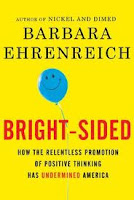Barbara Ehrenreich is a journalist, lecturer, activist, and the author of over 20 books, but she is perhaps best known for 2001's Nickel and Dimed: On (Not) Getting By in America, an undercover report of the living and work conditions of America's minimum wage workers. Though academically trained in chemistry (Ehrenreich received a PhD from Rockefeller University in 1968), she switched focus toward social justice and shortly thereafter published her first title in the field, Long March, Short Spring: The Student Uprisings at Home and Abroad. Ehrenreich recently spoke by phone to discuss immersion journalism, the current recession, and 2005's Bait and Switch: The (Futile) Pursuit of the American Dream, an examination of the challenges of unemployed white collar workers.
BurnThroug hBooks
hBooks: How do you prepare--psychologically and logistically--to go into an undercover role?
Barbara Ehrenreich: It's something I've only done twice. With
Nickel and Dimed I wasn't undercover; it was just me going out and getting those jobs. I was very unfamiliar with the genre, except for having read George Orwell's
Down and Out in Paris and London, but I had read that for pleasure. I didn't have any models. With
Bait and Switch, I had to go undercover. I changed back to my maiden name because I was pretty confident that I couldn't get get hired otherwise. So I had to fake a resume. In that case also I was a little concerned that my name might've been recognized.
I mainly faced things with dread. My writing life is very solitary and quiet. Suddenly, to be out there in the world, interacting with people, is kind of a rude shock, especially when you're doing it as someone else. I didn't know how to prepare myself. I had to find out more along the way. I didn't have the clothes. I thought what I considered professional clothes would be fine for being in the corporate role. I had to pay for a makeover. I had no idea. Dressing in a corporate way is like putting on a uniform, and every detail has to be right.
BTB: Comparing white collar job seekers' experiences with the subjects of
Nickel & Dimed, do you think one demographic has an advantage over the other when it comes to support networks and access to job opportunities?
Ehrenreich: Unemployment right now, compared to 2004 and 2005, is running much higher for blue collar workers. This is a recession that has really slammed blue collar workers. Most white collar workers have the advantage of easy internet access. They have their own laptop and a desk and can search for jobs from home. Many blue collar workers have to go to a library to use a computer and find jobs. But white collar workers undergo very long periods of unemployment, especially if they're over 45. It could be terminal.
BTB: What do you think will be the breaking point in unemployment, when conditions become so strained for so many that the system is compelled to change? Is our economy in danger of approaching that point?
 Ehrenreich
Ehrenreich: Are we in danger, or is it opportunity? I came away from
Bait and Switch kind of amazed with how well corporate America has managed disappointment and despair in the workforce. It's a big effort. There are placement firms where people get pep talks; there's the whole positive thinking psychology, which was something that led to my next book,
Bright Sided: How Positive Thinking is Undermining America. They work very hard to manage disappointment among white collar workers, and they do that by saying, "If you have a problem, it's your fault." That's worked for them so far. I'm trying to chip away at that.
BTB: I was interested to read in the book's introduction that this project was inspired by reader feedback to
Nickel & Dimed. What other subjects for investigation have floated across your desk?
Ehrenreich: I have no more immersion journalism projects planned. Sometimes I get identified with that. If that's a way to get an answer, then I'll do it, but mainly I go from one book to another.
Simon & Schuster Digital partnered with VYou.com to create Ask the Author, a digital venue for readers to interact with writers. On the new site, authors respond to reader-submitted questions through webcam videos.


